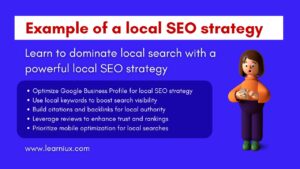Introduction
Local SEO is a game changer for businesses looking to connect with customers in their immediate area. Whether you run a small café, a retail store, or a service-based business like plumbing or hairdressing, local SEO helps you stand out in search results when people nearby are searching for what you offer. Simply put, local SEO is about making your business more visible online to people in your city or area. It’s a subset of search engine optimization that focuses on geographic relevance so that your business appears when someone searches for services or products near me. This article takes a deep dive into what local SEO is, why it’s important for businesses, and how to implement it effectively to drive more traffic and leads. By the end, you’ll have a clear understanding of local SEO and actionable steps to increase your business’s visibility in local search results.
Why Local SEO is Important
Local SEO is essential because these days, most consumers use search engines like Google to find nearby businesses. Imagine someone in Pune searching for a bakery near me. If your bakery in Pune is optimized for local SEO, it is more likely to appear at the top of their search results. Studies show that more than 70 percent of people searching for a local business visit a store within a few kilometers of their location. This makes local SEO a powerful tool for both small business startups and large companies with multiple locations. By focusing on local SEO, you can attract customers who are ready to buy your services. It also helps you compete with larger brands by leveling the playing field in your local area. For example, a small coffee shop can outperform a global chain in local search results with the right local SEO strategies.
Understanding Local SEO
Local SEO or local search engine optimization is the process of optimizing your online presence to attract customers in a specific geographic area. Unlike traditional SEO, which aims for broad national or global visibility, local SEO focuses on a local audience. It ensures that your business appears in search results when people include location-specific terms like Mumbai, dentist, or grocery store in Chennai. Local SEO involves a combination of tactics like optimizing your Google Business Profile using location-based keywords, building local citations, and getting positive customer reviews. The goal is to make it easy for search engines to understand where your business is located and what you offer so that they can recommend it to nearby searchers. For example, a yoga studio in Bengaluru that uses local SEO can appear in searches for yoga classes near me even though it’s a small business with a limited marketing budget.
Key Components of Local SEO
Local SEO relies on several key components that work together to increase your visibility in local search results. The most important is your Google Business Profile, which acts as your business’s online storefront on Google. A complete and accurate profile with details like your business name, address, phone number, website, and business hours is essential for local SEO success. Adding high-quality photos and regularly updating your profile with posts or offers can further boost your rankings. Another important factor is location-based keywords. These are phrases that include your city or area, such as pizza delivery in Hyderabad or best salon in Delhi. Including these keywords in your website content meta tags and blog posts helps search engines associate your business with local searches. Online reviews are also a key component in local SEO. Positive reviews on platforms like Google Yelp or local directories signal to search engines that your business is trustworthy and relevant. Encouraging happy customers to leave reviews and responding to feedback professionally can significantly improve your local SEO performance.
Benefits of Local SEO
The benefits of local SEO are numerous, especially for businesses that rely on local customers. First, it increases your visibility among people who visit your store or use your services. A strong local SEO strategy ensures that your business is often prominently featured in the top three business listings shown on Google Maps when someone searches for a service near them. Second, local SEO is cost-effective. Local SEO focuses on organic strategies that deliver long-term results, rather than paid advertising that requires ongoing investment. This makes it an attractive option for small businesses with limited budgets. Third, local SEO drives more foot traffic to physical stores. For example, a restaurant optimized for local SEO can attract diners looking for places to eat nearby, leading to more walk-ins. Additionally, local SEO builds trust with potential customers. People trust businesses with positive reviews and accurate online information, which local SEO helps you retain. Ultimately, it helps you stand out in a competitive market by targeting a specific local audience rather than trying to compete nationally or globally.
How Local SEO is Different from Traditional SEO
Both Local SEO and Traditional SEO aim to improve your search engine rankings, but they have different focuses. Traditional SEO is about reaching a large number of people, regardless of location. For example, an online retailer selling clothing might optimize for general keywords like winter jackets or running shoes to attract customers from anywhere. Local SEO, on the other hand, targets a specific geographic area. A shoe store in Kolkata would optimize for running shoes in Kolkata to attract local shoppers. Local SEO also relies heavily on location-based signals like your business address, citations in local directories, and proximity to the searcher. Another difference is the emphasis on Google Business Profiles, which play a minimal role in traditional SEO but are central to local SEO. Additionally, Local SEO prioritizes mobile searches because many local searches occur on smartphones when people are on the go. Understanding these differences helps businesses choose the right SEO strategy for their goals.
Steps to Implement Local SEO
A strategic approach is required to implement local SEO effectively. Start by claiming and optimizing your Google Business Profile. Make sure all details are accurate, including your business name, address, phone number, website, and hours. Add high-quality photos of your business products or services, and post regular updates like special offers or events to engage customers. Next, focus on using location-based keywords. Research keywords that your target audience uses, such as best coffee shop in Ahmedabad or car repair near me, and incorporate them naturally into your website content titles, meta descriptions, and blogs. Another important step is to create local citations that are mentions of your business on online directories like Justdial Sulekha or Yelp. Make sure your business name, address, and phone number are consistent across all platforms to avoid confusing search engines. It is also important to encourage customer reviews. Politely ask satisfied customers to leave reviews on Google or other platforms and respond positively or negatively to all reviews to show you that they value your feedback. Finally, consider building local backlinks by partnering with local blog businesses or community organizations. These backlinks signal to search engines that your business is a trusted part of the local community.
Common Mistakes to Avoid in Local SEO
While local SEO is extremely effective, it’s easy to make mistakes that can hurt your rankings. One common mistake is having inconsistent business information across online platforms. For example, if your business address is different on your website, Google Business Profile and local directory search engines may have trouble verifying your location. Always make sure your name, address, and phone number are the same everywhere. Another mistake is ignoring customer reviews. Ignoring negative reviews or failing to promote positive reviews can weaken your local SEO performance. Responding to reviews promptly and professionally shows search engines and customers that you are engaged. Using irrelevant or overly broad keywords is another pitfall. For example, a dentist in Jaipur should avoid targeting general terms like dentist and instead focus on Jaipur dentists or dental clinics in Jaipur. Finally, some businesses fail to update their Google Business Profile regularly. Outdated hours or incorrect contact details can frustrate customers and hurt your local SEO efforts. Avoiding these mistakes will ensure that your local SEO strategy is effective and sustainable.
Advanced Local SEO Strategies
There are advanced strategies to consider for businesses looking to take local SEO to the next level. One is voice search optimization, which is growing in popularity thanks to devices like Alexa and Google Assistant. People often use voice search for local queries like where the nearest gym is, so incorporating conversational phrases into your content can improve your rankings. Another advanced tactic is to create blog posts about local events, community news, or neighborhood guides. For example, a real estate agent in Bengaluru could write a guide to the best neighborhoods in the city, which can increase their local SEO relevance. Using social media for local engagement is also effective. Share posts about local events or promotions on platforms like Instagram or Facebook to connect with your community and drive traffic to your website. Finally, consider using schema markup, which is a type of structured data that helps search engines better understand the content of your website. Adding local business schema to your site can increase your chances of appearing in rich snippets like star ratings or map results.
Measuring Local SEO Success
You need to track key metrics to know if your local SEO efforts are working. Start with your Google Business Profile Insights, which shows how many people viewed your profile and clicked to call or asked for directions. These metrics show how well your profile is attracting local customers. Next, monitor your website traffic using tools like Google Analytics. Look for increases in organic traffic from local searches or specific location-based keywords. Another important metric is your ranking in local search results. Tools like Moz Local or SEMrush can help you track where your business appears for relevant keywords. Customer reviews are also a good indicator of success. An increase in positive reviews and higher ratings can boost your local SEO performance. Finally, track foot traffic or leads if possible. For example, if you see more phone calls or store visits after implementing local SEO strategies, it’s a sign that your efforts are paying off. Regularly reviewing these metrics can help you refine your approach and increase results.
Conclusion
Local SEO is an important strategy for any business that serves customers in a specific area. By optimizing your Google Business Profile with location-based keywords, gaining positive reviews, and building local citations, you can significantly improve your visibility in local search results. Unlike traditional SEO, which casts a wide net, local SEO focuses on connecting you with nearby customers who are ready to engage with your business. Whether you’re a small shop, restaurant, or service provider, local SEO provides a cost-effective way to attract more traffic, build trust, and compete with larger brands. You can take your local SEO efforts to new heights by avoiding common mistakes and exploring advanced strategies like voice search optimization or hyperlocal content. Start implementing these local SEO tactics today and watch your business grow in your community.
FAQs
What is Local SEO in simple terms?
Local SEO is the process of optimizing a business’s online presence to attract customers in a specific geographic area. It helps businesses like restaurants, shops, or service providers appear in search results when people nearby search for their offerings. For example, a bakery in Mumbai can use local SEO to appear when someone searches for “bakery near me.” This includes strategies like optimizing your Google Business Profile, using location-based keywords, and getting customer reviews. Unlike traditional SEO, which targets a broad audience, local SEO focuses on local customers. This makes it ideal for businesses that rely on foot traffic or local clients. By improving local SEO, businesses can increase their visibility in local search results. It’s a cost-effective way to compete with larger brands in your area. Local SEO ensures that your business is easily found by people who are ready to visit or make a purchase.
Why is local SEO important for small businesses?
Local SEO is important for small businesses because it helps them attract customers in their immediate area. Most people use search engines to find nearby services, such as coffee shops or plumbers. Local SEO ensures that your business appears in these searches, which leads to more traffic. For example, a small salon in Delhi can rank higher than a national chain with proper local SEO. It levels the playing field, allowing small businesses to compete locally. Optimizing your Google Business Profile and getting reviews builds trust with potential customers. Local SEO is also budget-friendly, relying on organic strategies instead of expensive advertising. It helps small businesses connect with customers who are ready to buy or visit. Without local SEO, small businesses risk being overlooked in favor of competitors.
How is local SEO different from traditional SEO?
Local SEO focuses on improving a business’s visibility in a specific geographic area, while traditional SEO aims to achieve a broader, often national or global reach. For example, a local shoe store might target “shoes in Chennai,” while an e-commerce site might use “shoes” for traditional SEO. Local SEO relies heavily on location-based signals, such as your business address and local reviews. It prioritizes tools like Google Business Profiles, which are less important in traditional SEO. Local SEO also caters to mobile searches, as many local queries occur on the go. Traditional SEO focuses on general keywords and broad content strategies. Local SEO is ideal for businesses with physical locations or local services. Both strategies aim to improve search rankings but target different audiences. Understanding this difference can help businesses choose the right approach.
What is the role of Google Business Profiles in local SEO?
A Google Business Profile is a cornerstone of local SEO, serving as your business’s online storefront on Google. A well-optimized profile ensures that your business appears in local search results and on Google Maps. It includes important details like your business name, address, phone number, and hours. Adding photos, services, and regular updates like posts or offers increases engagement. A complete profile tells Google that your business is legitimate and relevant. Responding to customer reviews on your profile builds trust and improves rankings. For example, restaurants with an updated profile are more likely to appear in “restaurants near me” searches. It’s free to set up and manage, making it accessible to all businesses. An optimized Google Business Profile is essential for local SEO success.
How do customer reviews affect local SEO?
Customer reviews are a key component of local SEO because they signal trust and credibility to search engines. Positive reviews on platforms like Google or Yelp can improve your ranking in local search results. They also influence potential customers, as people trust businesses with good ratings. For example, gyms with many positive reviews are more likely to attract local clients. Encouraging satisfied customers to leave reviews increases your local SEO performance. Responding to both positive and negative reviews shows engagement and builds trust. Negative reviews, if handled professionally, can still contribute positively to your reputation. Search engines like Google use review quantity and quality as ranking factors. Proactively managing reviews is an important part of a successful local SEO strategy.
What are location-based keywords in local SEO?
Location-based keywords are phrases that include specific geographic terms, such as “dentist in Bangalore” or “cafe in Pune.” They help search engines associate your business with local searches. Using these keywords in your website content, meta tags, and blog posts improves local SEO. For example, a florist might use “flower delivery in Hyderabad” to attract customers from nearby locations. These keywords should be relevant and used naturally so as not to sound forced. Researching what local customers search for helps identify the best keywords. They signal to search engines where your business operates and what it offers. Including location-based keywords in your online presence increases visibility. They are a key part of any local SEO strategy.
How can businesses get started with local SEO?
To get started with local SEO, claim and optimize your Google Business Profile with accurate details like address and hours. Next, research location-based keywords related to your business and use them in your website content. Make sure your business is consistently listed on local directories like JustDial or Sulekha. Encourage customers to leave reviews and respond to them promptly. Create content like blogs about local events to increase relevance. Build local backlinks by partnering with nearby businesses or blogs. Update your website and profile regularly to keep the information up-to-date. Monitor your progress using tools like Google Analytics or Google Business Profile Insights. Starting with these steps builds a strong foundation for local SEO success.
What mistakes should businesses avoid in local SEO?
Businesses should avoid inconsistent information on online platforms, such as matching addresses or phone numbers. This confuses search engines and hurts local SEO rankings. Ignoring customer reviews is another mistake; ignoring feedback or not encouraging reviews reduces credibility. Using broad or irrelevant keywords instead of location-specific keywords can undermine local SEO efforts. Failing to update your Google Business Profile with current hours or services frustrates customers. Not optimizing for mobile users is a big mistake, as many local searches occur on smartphones. Avoid ignoring local backlinks, as they increase authority. To avoid these pitfalls, regularly check your listings and interact with customers. A consistent, proactive approach ensures strong local SEO performance.
Can local SEO help businesses without a physical storefront?
Yes, local SEO can benefit businesses without a physical storefront, such as service-based or home-based businesses. For example, a freelance plumber can optimize for “plumbing services in Delhi” to attract local customers. A Google Business Profile can list the service area instead of the physical address. Using location-based keywords on your website helps target local customers. Online reviews from satisfied customers build trust and improve rankings. Listing your business in local directories increases visibility. Creating content about your service area, such as a neighborhood guide, increases relevance. Local SEO ensures that businesses without a storefront also appear in local searches. This is a flexible strategy for any business that serves a specific area.
How can businesses measure the success of their local SEO efforts?
Businesses can measure local SEO success by tracking key metrics like Google Business Profile Insights. This shows how many people viewed your profile, clicked to call, or requested directions. Website traffic from local searches, tracked by Google Analytics, shows whether your local SEO is working. Monitor your rankings for location-based keywords using tools like Moz or SEMrush. An increase in positive reviews and high ratings is a good sign. Track foot traffic or leads, such as phone calls or bookings, to see real-world results. Check these metrics regularly to refine your strategy. Consistent improvements in these areas show that your local SEO efforts are effective. Tools and analytics make it easy to measure progress.





















































